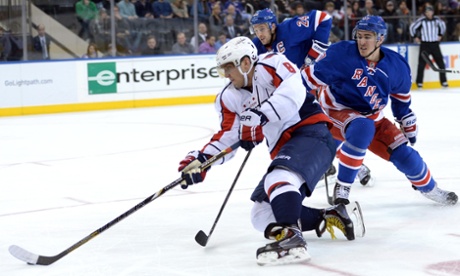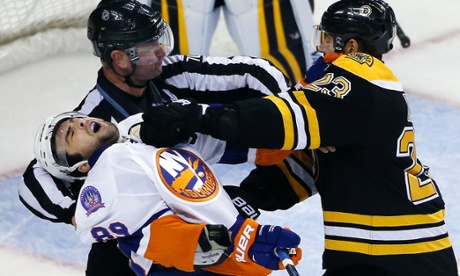What happened?
Just past the halfway point of the first period in Monday night’s game between the defending Stanley Cup champions Washington Capitals and the upstart Carolina Hurricanes, Washington captain Alexander Ovechkin got into a fight.
Was anyone hurt?
Andrei Svechnikov gets into a fight with heavyweight, Alex Ovechkin, and is knocked out cold #StanleyCupPlayoffs pic.twitter.com/TK7Xu1upo5
— James Nalton (@JDNalton) April 16, 2019
Er, yes. A 19-year old Carolina Hurricanes player by the name of Andrei Svechnikov. Svechnikov and Ovechkin were skating next to one another and exchanged a few quick slashes with their sticks. Words were then exchanged. The two dropped gloves, and Ovechkin – who has about 40lbs on Svechnikov – landed a few quick punches, one of which was a knockout blow. Svechnikov fell to the ice, clearly concussed. Svechnikov, the youngest player in this year’s NHL playoffs, is now in the league’s concussion protocol, and will very likely miss Game 4 in the series against Washington on Wednesday night.
Hockey players fight all the time though. Why was Monday night’s fight different?
Mostly because Ovechkin was involved – he rarely fights. He’s done so only four times since he joined the NHL in the 2005-06 season, and this was his first since 2010 when he fought Brandon Dubinksy of the New York Rangers. Ovie is no lightweight – he’s 6ft 3in and 230lbs – but has made his name as a finesse player and high-powered goal-scorer, rather than as a physical presence.
Why is fighting allowed in hockey?
The simplest answer is that it pretty much always has been. An old story goes that the first indoor hockey game was played at the Victoria Skating Rink in Montreal in 1875 – and ended with a fight. Existing members of the rink’s skating club tried to kick the hockey teams off the ice and the groups came to blows. As it happens, head injuries associated with hockey fights go back to the same day: “Newspaper reports of the time indicated a boy got mixed up with the players during the melee and suffered a head injury and that put an end to things,” Scott Burnside recounted on the 142nd anniversary of the game (and the skirmish).
Fighting in hockey has evolved with the sport, but has long been a way for teams to either set a tone for the kind of game they’re looking to play, create energy on the bench when they find themselves lagging, or as simple retribution. Unlike other sports where it’s strictly forbidden, over the decades, fighting became built-in to hockey and its officiating – regulated rather than banned.
Isn’t anyone trying to stop fighting in hockey?
Yes, but it’s also stopping of its own accord. Monday night’s fight was also notable simply because it happened at all. There are generally fewer fights during the playoffs, because the stakes are higher and a five-minute major penalty is too risky. But aside from that, despite hockey’s enduring reputation as a punch-up, fighting is actually on its way out of the NHL. According to TSN, the average number of fights per NHL game is steadily falling. The rate of fights per game was just 0.2 as of November, down from 0.6 a decade ago, and a far cry from the 1980s, where you’d likely see at least one per game, according to TSN.
That trend isn’t necessarily because of enforcement (though that’s helped), but also due to a shifting culture within hockey itself – from coaches to players – and amongst fans. Fighting’s place in hockey is still accepted, and when fights occur, fans are still excited, but as individual skill and speed has increased, fighting just doesn’t have the cache it once did.
At its most notorious – in the latter decades of the 20th century – teams adopted fighting as a more obvious tactic, employing “enforcers” whose role was to protect higher-skilled players and, essentially, pick fights. Guys like Marty McSorley, Dave “Tiger” Williams, Bob Probert, Donald Brashear, Dave “Cementhead” Semenko, Tie Domi, Georges Laraque, and Derek Boogaard (to name a few) all made a name for themselves doing this job.
The fact that everyone in and around hockey is so familiar with the last name on that list is probably one of the reasons the “enforcer” role has faded away, and fights have gone with it. Boogaard’s death at 28 from an accidental overdose of oxycodone and alcohol, occurred shortly after the deaths of two other “enforcers”, Rick Rypien and Wade Belak, and it proved a catalyst for a shift in the conversation about concussions (Boogaard’s brain showed advanced chronic traumatic encephalopathy – as did that of Probert) and questions about why fighting had been tolerated for so long.
Though NHL commissioner Gary Bettman has pushed back against growing evidence that the game – and particularly the concussions that occur during it – can cause brain damage, players, fans and above all parents enrolling their kids in youth hockey are less deaf to the science.
So, will Ovechkin get into trouble?
Technically, he did. Ovechkin was given a five-minute major penalty after the fight. He sat in the penalty box for the allotted time, then returned to the ice when it was over. As it happens, Svechnikov was also given a five-minute major penalty – he just wasn’t able to return from it. It remains to be seen when he will.











